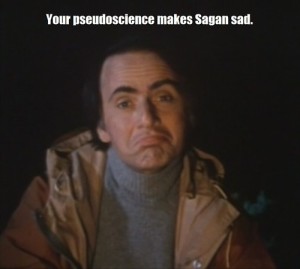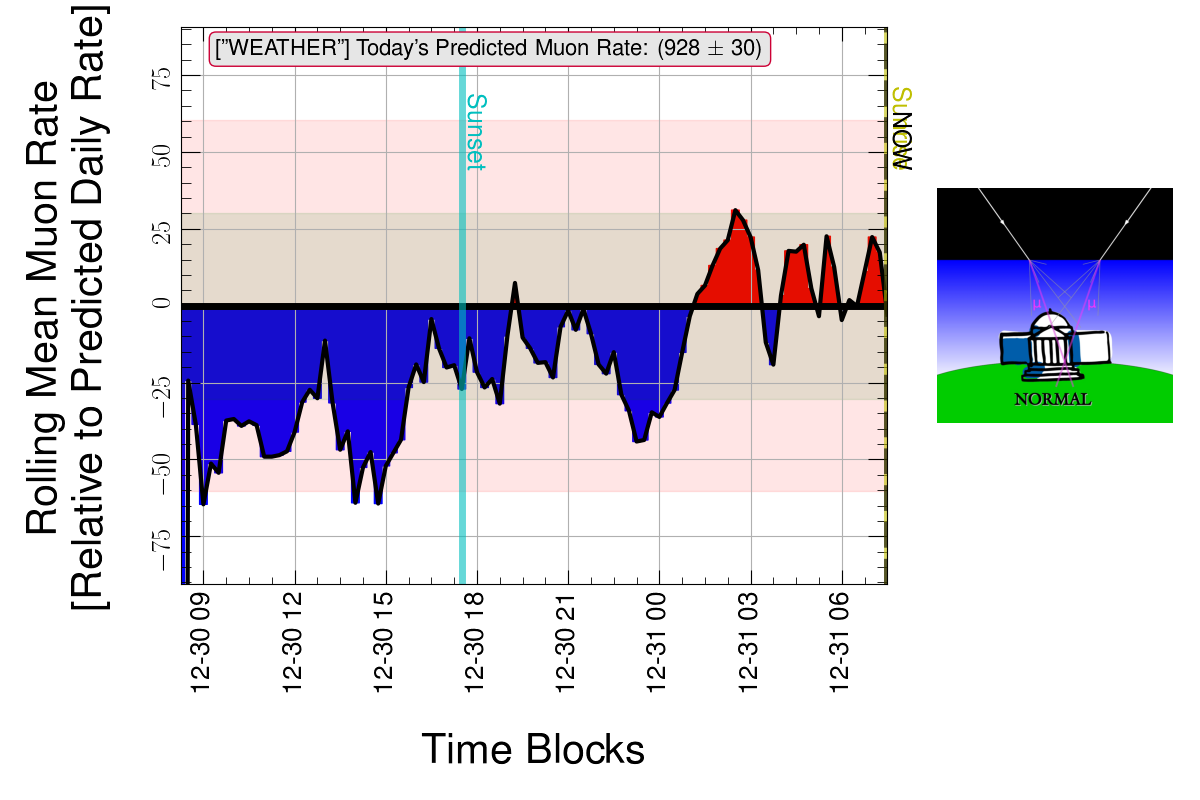
For the first day of class yesterday, I tried a new trick. We usually poll the class about issues that have a real science component, like vaccination or alternative medicine. It helps us to understand what they think they know. We added a new component yesterday, something we’ve talked about doing to a few years – we added a “psychic medium” trick to the first lecture. The names of the students, and their details, are changed to protect their identities.
The trick goes as follows. I tell the audience that the dead spirit of Carl Sagan speaks to me. I tell them he tells me things about the students. I get quiet, and I put a hand in the air and the other on my forehead. I say something like, “Yes . . . he’s here. He’s speaking to me now.” Some folks in the audience chuckle or smile; most are just quiet.
“It’s coming from over here,” I say, and gesture to the entire right half of the class. More chuckling erupts from the audience.
“I’m getting . . . something about a flower. Maybe . . . yes . . . maybe it’s a rose. A rose? Maybe it’s the name, Rosie?”
I miss. Rosie is not in the audience today, on the first day of class. No problem . . . Carl is still talking to me, feeding me information, so I move on.
“I’m getting something else. I’m seeing . . . maybe . . . Star Trek? Yes. I’m seeing . . . Captain Jean Luc Picard? Is there a Jean Luc in the audience?”
A student looks a little startled, and raised his hand. He is Jean Luc. “Ah, good. You’re the person Carl was telling me about. I see . . . yes . . . he’s telling me that you have a keen mind. You’re . . . you’re an engineering major?”
The student reluctantly nods, and his eyes are wider now. The room is eerily quiet. Nobody is chuckling anymore. “Carl is also telling me . . . yes, I see it now. He is telling me that you like sports, too? You like sports . . . you like going to sporting events, but not alone. You like going with your friends. I see . . . I see you and a bunch of friends, arms around one another, at the United Airlines Center? Yes, it’s the United Airlines Center. It’s . . . Thanksgiving, or around Thanksgiving?”
The student doesn’t seem to know what Carl is talking about. But I know that I’m right, not only because of Carl’s insistent voice, but because the student sitting next to Jean Luc is freaking out. She’s trying to tell him by whispering that I am right. Jean Luc isn’t sure . . . he doesn’t recall this event clearly . . . but she does. And she is wide-eyed and excited and, perhaps, a little alarmed.
“I am getting November 22? I see that clearly.”
He’s still not sure, but she’s even more sure. I go for the finish. “Well, I see a photo of you and your friends in front of the United Center on November 22. You should check your Facebook page.”
The room erupts with laughter. I explain the trick, thank Jean Luc for being such a good sport, and toss him a door prize (one of those rubber wristbands, this one in support of a fake disease).
The Trick
Let me start by saying: I am not psychic. The dead spirit of Carl Sagan does not talk to me. However, I’m also not stupid. I know how to use the internet and the web to learn public things about people that they forget are public. I am also a faculty member at SMU – I know the roster of my class before I even set foot in the room. I can know their names, their majors, etc. Facebook tells me things I shouldn’t know, but the students make public. I can find their home towns, their birthdays, and I can see photos they forget are public. Those photos tell stories and reveal details. Armed with this information, I can execute a very convincing “hot read” of an audience member. Here is how I did it.
- Before class, I memorize the names and faces of about 6 students. Not all students show up on the first day of class, so this gives me a safe pool of students to draw from.
- I also memorize their majors or, if they are a “pre-major,” their possible area of study. If they are a pre-major, and they are Juniors, then I can also assume they have “commitment issues” or that they have not yet “found their passion” – that is information I can bank for the hot read. It can seem like psychic powers, but it is a simple inference drawn from their major status.
- I then look them up on Facebook. That gives me recent photos (their student photos are old and bad). They also often post their birth day, home town, and other personal info as “public.” So I gather than and memorize a single, specific fact about them (like the details of a photo). For instance, I found a photo Jean Luc posted on his Facebook page, with the United Airlines Center in Chicago in the background; he and his friends were arm-in-arm in the foreground. The photo was posted on Nov. 22, so that was easy. It is a specific thing I can’t possibly know . . . unless I looked it up on Facebook!
- You need some showmanship to draw it out and pull it off, convincing the audience that you are “getting messages from the dead.” You need to add dramatic pauses, you need a physical tick or some other gimmick to convince them that this is difficult or exhausting. Do whatever you like, but do something. I close my eyes, hold my forehead, and put the other hand in the air. I look like an antenna with a migraine. It’s awesome and convincing.
- You need to embellish, and put in some weird starts and semi-fails to convince the audience that the line of communication to the dead is imperfect – not like speaking, but like looking at a semi-abstract painting. That is more convincing than just repeating facts. That’s why I threw in weird things like “Star Trek” before getting to the student’s name.
You also have to be ready to fail. If you bomb, move on. Don’t admit the mistake, just go to the next part of the schtick. People tend to forget the misses if your hits become spectacular. It’s basic human psychology – specifically, it’s neuroscience, because our brains are not hard drives and they decide within a few seconds what to keep and what to toss. Misses are useless, and tend to be discarded by the brain. You can use that against people.
You can try it too! At your next conference talk, if you want to incorporate a couple of minutes that mess with your audience, try adding a cold + hot read. I like the hot read. It’s safe and easy to do – you just need a name and two basic facts about the mark. One of those facts should seem “impossible” for you to know (how could I possibly have known that Jean Luc was at the United Center on November 22?). Save that for last. They will forget all your mistakes if you make an unlikely but spectacular hit at the end.
Final Comments
This trick is how “psychics” fleece thousands of dollars out of people who want to believe in psychics. There is no credible and reliable evidence for the existence of psychics, and until all psychics submit to randomized, double-blind, deception-controlled scientific testing of their claims, you should not give them a single dollar of your money. TV psychics are often no better than flipping a coin, and they are ONLY that good because of editing. Think critically before accepting the claim that people speak to the dead. You might be about to be parted from your money.




